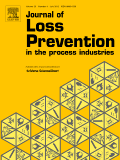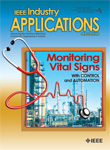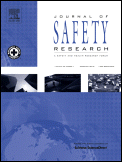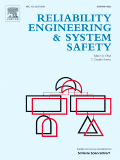
JOURNAL OF LOSS PREVENTION IN THE PROCESS INDUSTRIES
Scope & Guideline
Empowering industries through cutting-edge risk management research.
Introduction
Aims and Scopes
- Risk Assessment and Management:
The journal highlights methodologies for assessing and managing risks in various industrial processes, including quantitative risk analysis and probabilistic models. - Explosion and Fire Safety Research:
A core area of focus is the investigation of explosion and fire dynamics, including studies on dust explosions, gas explosions, and fire suppression techniques. - Human Factors and Safety Culture:
Research on human behavior, safety culture, and organizational factors that contribute to accidents is emphasized, aiming to improve safety practices in industrial settings. - Innovative Safety Technologies:
The journal covers the development and application of innovative technologies for safety management, including computational fluid dynamics (CFD), machine learning, and advanced materials for hazard prevention. - Regulatory and Compliance Issues:
It addresses regulatory frameworks and compliance challenges within the process industries, providing insights into best practices for safety management. - Environmental and Occupational Safety:
The journal also explores the intersection of environmental safety and occupational health, promoting safer practices in the handling of hazardous materials.
Trending and Emerging
- Data-Driven Risk Management:
There is a growing trend towards utilizing data analytics and machine learning for risk management and predictive modeling, enhancing the ability to foresee and mitigate potential accidents. - Sustainability and Inherent Safety:
Research focusing on sustainability and inherently safer design principles is on the rise, reflecting an industry-wide shift towards minimizing environmental impact and enhancing safety from the design phase. - Cybersecurity in Process Safety:
As industries become more digitized, the intersection of cybersecurity and process safety is emerging as a critical area of study, addressing vulnerabilities in automated systems. - Integrated Safety Management Systems:
There is an increasing focus on the integration of occupational safety and process safety management systems, promoting a more comprehensive approach to safety. - Advanced Materials for Explosion Prevention:
Studies exploring the use of advanced materials and coatings for explosion prevention and fire suppression are trending, showcasing innovation in safety technologies.
Declining or Waning
- Traditional Risk Assessment Models:
There has been a noticeable decline in publications focused on traditional risk assessment models, as researchers are increasingly adopting more complex and integrated approaches that incorporate machine learning and advanced statistical techniques. - Basic Fire Safety Codes:
Research centered on basic fire safety codes and regulations has waned, possibly due to a shift towards more innovative safety technologies and practices that go beyond conventional codes. - Single-Factor Risk Studies:
Studies focusing solely on single-factor risks without considering multi-hazard scenarios or comprehensive risk assessments are becoming less common, reflecting a trend towards more holistic approaches.
Similar Journals

Journal of Health and Safety at Work
Advancing workplace wellness through open scholarship.The Journal of Health and Safety at Work, published by the Iranian Occupational Health Association, is a vital resource for researchers, professionals, and students engaged in the fields of occupational health, safety, and environmental management. With an ISSN of 2251-807X and E-ISSN 2383-2088, this Open Access journal has been dedicated to disseminating knowledge since 2012, ensuring that critical research is accessible to a global audience. The journal’s scope encompasses a diverse range of topics including human factors and ergonomics, safety research, and public health, with a focus on enhancing workplace safety and environmental standards. Although currently positioned in the Q4 category across various disciplines within safety and health research, the journal offers a unique platform for emerging studies and innovative practices, making it a significant contributor to the discourse in these fields. The journal's commitment to open access aligns with the growing trend of transparent scholarship, thus facilitating the sharing of vital insights to improve workplace health and safety outcomes. Researchers aiming to publish groundbreaking studies in this pivotal area will find the Journal of Health and Safety at Work an indispensable avenue for advancing knowledge and fostering professional collaboration.

Fire-Switzerland
Empowering global discourse on fire safety and environmental science.Fire-Switzerland is a renowned, peer-reviewed academic journal published by MDPI, focusing on critical issues intersecting the fields of fire safety, environmental science, and forestry. Launched in 2018, this Open Access journal provides a platform for innovative research and practical solutions that address the complexities of fire in various ecosystems and urban environments. With an impressive standing, it has achieved notable quartile rankings, including Q1 in Forestry and Q2 in multiple categories such as Building and Construction, Earth and Planetary Sciences, and Safety Research as of 2023. Geographically rooted in Switzerland, Fire-Switzerland aims to foster international discourse and collaboration among researchers, professionals, and policymakers dedicated to enhancing fire management and safety practices. By making its content freely accessible to a broader audience, the journal plays a pivotal role in advancing knowledge and promoting awareness of fire-related challenges and innovations globally.

IEEE INDUSTRY APPLICATIONS MAGAZINE
Unveiling Trends that Shape the Industry.IEEE Industry Applications Magazine, published by the IEEE Institute of Electrical and Electronics Engineers, is a distinguished periodical that dives into the multifaceted field of industrial applications of electrical and electronic engineering. With its roots dating back to 1995 and advancing through to 2024, the magazine offers practitioners and researchers valuable insights through a range of articles that cover emerging trends, innovative technologies, and practical solutions across key areas including Control Systems, Energy Engineering, and Industrial Manufacturing. Although not an open access journal, it holds a notable Q3 ranking across multiple categories, revealing its relevance and contribution to the industry. The journal serves as an essential resource for professionals seeking to stay abreast of advancements and methodologies that drive the industrial sector forward. As a prominent publication in its field, IEEE Industry Applications Magazine plays a critical role in fostering knowledge exchange and shaping future innovations in engineering.

JOURNAL OF SAFETY RESEARCH
Transforming safety discourse with empirical findings.The JOURNAL OF SAFETY RESEARCH, published by Pergamon-Elsevier Science Ltd, stands as a premier platform for scholarly discourse within the domain of safety, risk, reliability, and quality. With an esteemed impact factor and a strong ranking of #38 out of 207 in its category as per Scopus, this journal maintains a distinguished Q1 quartile status, reflecting its influence and significance in advancing safety research since its inception in 1969. Researchers, practitioners, and students alike will find a wealth of knowledge here as the journal explores critical aspects of safety in various contexts, highlighting innovative strategies and empirical findings that contribute to improved safety outcomes globally. Though it operates under a traditional access format, the journal’s extensive repository of articles ensures that vital information remains accessible to its readership. The JOURNAL OF SAFETY RESEARCH is not only a cornerstone for those within the safety engineering field, but also a vital resource for professionals seeking to enhance their understanding of risk management and quality assurance methodologies.

International Journal of Maritime Engineering
Pioneering Sustainable Solutions for Maritime ChallengesThe International Journal of Maritime Engineering (ISSN: 1479-8751, E-ISSN: 1740-0716), published by UNIV BUCKINGHAM PRESS in the United Kingdom, is a vital resource for the maritime engineering community, addressing pressing issues in both Environmental Engineering and Ocean Engineering. Established in 2006, this journal serves as a platform for disseminating innovative research, technological advancements, and practical solutions that enhance the sustainability and efficiency of maritime operations. With its current classification in the Q3 quartile for both fields in 2023, it offers valuable insights to researchers, professionals, and students who seek to bridge theoretical knowledge with industry applications. Though the journal does not operate under an open access model, it remains an essential reference for academic discourse and advancement in maritime studies through its rigorous peer-review process and high-level research outputs.

Journal of Machinery Manufacture and Reliability
Elevating knowledge in industrial engineering and quality assurance.The Journal of Machinery Manufacture and Reliability, published by PLEIADES PUBLISHING INC, serves as a pivotal platform for advancing knowledge in the fields of Industrial and Manufacturing Engineering, Mechanical Engineering, and Safety, Risk, Reliability, and Quality. Having adopted an Open Access model since 2015, this journal facilitates global dissemination of research findings and innovations, ensuring that critical developments in machinery manufacture resonate across the academic and professional spectrum. With its ISSN 1052-6188 and E-ISSN 1934-9394, it has established itself within established quartiles, notably Q3 in key engineering categories according to the 2023 metrics. Its Scopus rankings underscore its emerging impact, though it remains an area for growth, making it an excellent venue for early-career researchers aiming to contribute to a growing body of literature. The journal's commitment to high-quality, accessible research positions it as a must-read for academics and practitioners alike, fostering innovation and collaboration in the machinery manufacturing sector.

Advanced Industrial and Engineering Polymer Research
Advancing Knowledge in Materials ScienceAdvanced Industrial and Engineering Polymer Research (ISSN: 2542-5048), published by KEAI PUBLISHING LTD, stands as a pivotal Open Access journal dedicated to the cutting-edge advancements within the fields of materials science and polymer engineering. Established in 2018, this journal aims to foster innovation and disseminate high-quality research that spans the realms of chemical engineering, industrial and manufacturing processes, and polymer applications. With impressive category quartile rankings in Q1 across various disciplines—including Chemical Engineering, Industrial and Manufacturing Engineering, and Materials Science—this journal represents a significant resource for researchers, industry professionals, and students alike. Offering access from its headquarters in Beijing, China, and embracing a commitment to open access since its inception, Advanced Industrial and Engineering Polymer Research ensures that groundbreaking findings are readily available, facilitating collaboration and enhancing knowledge in the global scientific community.

Journal of the Pakistan Institute of Chemical Engineers
Innovating Solutions, Shaping Tomorrow's Chemical Engineers.The Journal of the Pakistan Institute of Chemical Engineers serves as a pivotal platform for advancing the field of chemical engineering within Pakistan and beyond. Published by the Pakistan Institute of Chemical Engineers, this journal aims to disseminate high-quality research, reviews, and case studies that cover a wide scope of topics relevant to chemical engineering, including process design, environmental technology, and materials science. Although it operates under a non-open access model, the journal is committed to maintaining rigorous peer-review standards to ensure the publication of impactful articles that contribute to the advancement of knowledge and best practices in the discipline. As a hub for researchers, professionals, and students alike, this journal not only fosters academic collaboration but also plays an integral role in shaping the future of chemical engineering in the region. With an ISSN of 1813-4092, it is dedicated to enhancing the visibility and accessibility of chemical engineering research, promoting innovation and education within the field.

RELIABILITY ENGINEERING & SYSTEM SAFETY
Exploring the Intersection of Reliability and Quality.RELIABILITY ENGINEERING & SYSTEM SAFETY is a leading interdisciplinary journal published by Elsevier Sci Ltd, dedicated to advancing knowledge in the fields of applied mathematics, industrial and manufacturing engineering, and safety, risk, reliability, and quality. With a significant presence since its inception in 1983, this esteemed journal, identifiable by ISSN 0951-8320 and E-ISSN 1879-0836, holds an impressive impact factor and ranks in the top quartile (Q1) of its categories according to the most recent metrics. Specifically, it has achieved remarkable standings in Scopus, ranking #3 out of 207 in Safety, Risk, Reliability and Quality, marking it in the 98th percentile, and #21 out of 384 in Industrial and Manufacturing Engineering, at the 94th percentile. This distinction underscores the journal's vital role in shaping research and innovation in its fields. While it does not operate under an open access model, RELIABILITY ENGINEERING & SYSTEM SAFETY remains an essential resource for researchers, professionals, and students, aiming to publish high-quality articles that facilitate the understanding and application of reliability engineering and systemic safety within various industrial contexts. Stay ahead in cutting-edge research by engaging with the latest articles and findings from this influential journal.

Journal of Structural Fire Engineering
Pioneering research for a safer built environment.The Journal of Structural Fire Engineering is a premier academic publication dedicated to advancing the field of fire safety and structural engineering. Published by Emerald Group Publishing Ltd, this journal features high-quality research and innovative solutions addressing crucial aspects of safety, risk, reliability, and the mechanics of materials. With an impact factor that reflects its growing influence in the academic community and a classification in the Q3 quartile across several engineering categories, the journal plays a vital role in disseminating knowledge that bridges theoretical concepts and practical applications. With coverage spanning from 2010 to 2024, researchers, professionals, and students can access a wealth of studies that explore the intersection of structural integrity and fire safety. While it currently operates under a subscription model, the journal remains committed to sharing pivotal insights that drive forward the discipline. Join the community of experts striving to enhance engineering practices and resilience against fire-related hazards.